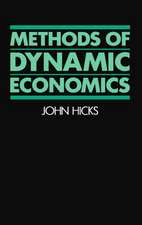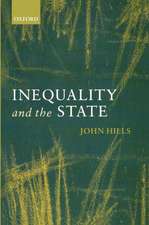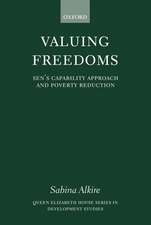Getting Development Right: Structural Transformation, Inclusion, and Sustainability in the Post-Crisis Era
Editat de E. Pausen Limba Engleză Hardback – 19 sep 2013
This book brings together development scholars and practitioners from multiple academic disciplines and policy perspectives to analyze important facets of this triple challenge, to explore interconnections among them and suggest strategies for overcoming the challenges in the current age of globalization. Three features distinguish this book from other current works in the field. First, this book looks beyond the current global crisis and short-term growth opportunities and analyzes the challenges to development from a long-term perspective. Second, books on the barriers to development tend to concentrate on one of the three challenges, e.g. Barbier (2010) A Global Green New Deal on environmental sustainability; Cimoli, Dosi, Stiglitz (2009) Industrial Policy andDevelopment on structural transformation; and Milanovic (2011) The Have and the Have-Nots on exclusion. This book, in contrast, brings the three challenges together to emphasize that they challenges are interlinked and that strategies and policies must begin to recognize these interconnections to address different aspects of the challenges concomitantly. Finally, the contributors to the book include some of the most renowned development thinkers of our time.
| Toate formatele și edițiile | Preț | Express |
|---|---|---|
| Paperback (1) | 383.93 lei 6-8 săpt. | |
| Palgrave Macmillan US – 19 sep 2013 | 383.93 lei 6-8 săpt. | |
| Hardback (1) | 391.40 lei 6-8 săpt. | |
| Palgrave Macmillan US – 19 sep 2013 | 391.40 lei 6-8 săpt. |
Preț: 391.40 lei
Nou
Puncte Express: 587
Preț estimativ în valută:
74.90€ • 77.76$ • 62.46£
74.90€ • 77.76$ • 62.46£
Carte tipărită la comandă
Livrare economică 24 martie-07 aprilie
Preluare comenzi: 021 569.72.76
Specificații
ISBN-13: 9781137340757
ISBN-10: 1137340754
Pagini: 244
Ilustrații: XIII, 226 p. 16 illus.
Dimensiuni: 152 x 229 x 14 mm
Greutate: 0.49 kg
Ediția:2013
Editura: Palgrave Macmillan US
Colecția Palgrave Macmillan
Locul publicării:New York, United States
ISBN-10: 1137340754
Pagini: 244
Ilustrații: XIII, 226 p. 16 illus.
Dimensiuni: 152 x 229 x 14 mm
Greutate: 0.49 kg
Ediția:2013
Editura: Palgrave Macmillan US
Colecția Palgrave Macmillan
Locul publicării:New York, United States
Cuprins
1. Getting Development Right; Eva Paus
PART I: TRANSFORMING THE STRUCTURE OF PRODUCTION
2. Structural Change, Economic Convergence And Industrialization; Dani Rodrik
3. Still Blowin' In The Wind: Industrial Policy, Distorted Prices And Implicit Reciprocity; Mario Cimoli, Gabriel Porcile, Elisa Calza
4. Social Policy And The Challenges Of The Post-Adjustment Era; Thandika Mkandawire
PART II: DEMOCRATIZING DEVELOPMENT
5. Inequality Of Opportunity, Income Inequality And Economic Mobility: Some International Comparisons; Francisco H. G. Ferreira, Paolo Brunori, Vito Peragine
6. Does Globalization Help To Overcome The 'Challenge Of Development?' Political Actors And Economic Rents In Central America And The Dominican Republic; Diego Sánchez-Ancochea
7. From Authoritarianism to People Power in the Middle East and North Africa: Implications for Economic Inclusion and Equity; Eva Bellin
PART III: MAKING THE ENVIRONMENT COUNT
8. The Macro And Mesoeconomics Of The Green Economy; José Antonio Ocampo
9. Environmental Sustainability And Poverty Eradication In Developing Countries; Edward Barbier
10. Environment As An Element Of Development. The Growing Role Of Energy Efficiency And Environmental Protection In Chinese Economic Policy; Deborah Seligsohn
PART I: TRANSFORMING THE STRUCTURE OF PRODUCTION
2. Structural Change, Economic Convergence And Industrialization; Dani Rodrik
3. Still Blowin' In The Wind: Industrial Policy, Distorted Prices And Implicit Reciprocity; Mario Cimoli, Gabriel Porcile, Elisa Calza
4. Social Policy And The Challenges Of The Post-Adjustment Era; Thandika Mkandawire
PART II: DEMOCRATIZING DEVELOPMENT
5. Inequality Of Opportunity, Income Inequality And Economic Mobility: Some International Comparisons; Francisco H. G. Ferreira, Paolo Brunori, Vito Peragine
6. Does Globalization Help To Overcome The 'Challenge Of Development?' Political Actors And Economic Rents In Central America And The Dominican Republic; Diego Sánchez-Ancochea
7. From Authoritarianism to People Power in the Middle East and North Africa: Implications for Economic Inclusion and Equity; Eva Bellin
PART III: MAKING THE ENVIRONMENT COUNT
8. The Macro And Mesoeconomics Of The Green Economy; José Antonio Ocampo
9. Environmental Sustainability And Poverty Eradication In Developing Countries; Edward Barbier
10. Environment As An Element Of Development. The Growing Role Of Energy Efficiency And Environmental Protection In Chinese Economic Policy; Deborah Seligsohn
Recenzii
"Finally, a twenty first century book about development that emphasizes how growth, diversification, equality, and the environment are the key ingredients for prosperity. This book couldn't come at a better time, as policy-makers and scholars debate what is next for the Millennium Development Goals." - Kevin P. Gallagher, Boston University, Boston, USA
"This book presents a valuable collection of studies that deal with the challenging trade-offs among inclusionary growth, environmental sustainability and structural transformation. It emphasizes the importance of growth-enhancing structural transformation as the basis for growth. An integrated approach is needed because an isolated analysis of each of the challenges is of limited use. This book is an important step in our common journey towards an integrated solution." - Keun Lee, Seoul National University, South Korea
"Developing countries today face a triple challenge: how to increase productivity, reduce inequalities of opportunity, and sustain environmental quality. Getting Development Right offers fresh insights into all three pieces of the development puzzle. The book strikes a fine balance in analyzing both the obstacles and the opportunities being created by the global integration of markets and governance." - James K. Boyce, University of Massachusetts, Amherst, USA
"This book presents a valuable collection of studies that deal with the challenging trade-offs among inclusionary growth, environmental sustainability and structural transformation. It emphasizes the importance of growth-enhancing structural transformation as the basis for growth. An integrated approach is needed because an isolated analysis of each of the challenges is of limited use. This book is an important step in our common journey towards an integrated solution." - Keun Lee, Seoul National University, South Korea
"Developing countries today face a triple challenge: how to increase productivity, reduce inequalities of opportunity, and sustain environmental quality. Getting Development Right offers fresh insights into all three pieces of the development puzzle. The book strikes a fine balance in analyzing both the obstacles and the opportunities being created by the global integration of markets and governance." - James K. Boyce, University of Massachusetts, Amherst, USA
Notă biografică
University of Pittsburgh, Ph.D., M.A., B.A.
Eva Paus has published widely on different aspects of globalization and development. She recently co-edited 'Global Giant: Is China Changing the Rules of the Game?' (Palgrave Macmillan, 2009), which is based on the McCulloch Center conference "The Rise of China" in March 2008.
Her current research projects focus on the implications of the rise of China for the development prospects of (other) developing countries, the dilemma of policy space for pro-active development policies under current international multi-lateral and bilateral trade agreements, the role of foreign direct investment in the development process, and successful strategies in moving towards high-technology production.
Paus is the director of the McCulloch Center for Global Initiatives, a key part of the Plan for Mount Holyoke 2010. The mission of the Center is to equip MHC students to confront the global challenges of the 21st century.
Eva Paus has published widely on different aspects of globalization and development. She recently co-edited 'Global Giant: Is China Changing the Rules of the Game?' (Palgrave Macmillan, 2009), which is based on the McCulloch Center conference "The Rise of China" in March 2008.
Her current research projects focus on the implications of the rise of China for the development prospects of (other) developing countries, the dilemma of policy space for pro-active development policies under current international multi-lateral and bilateral trade agreements, the role of foreign direct investment in the development process, and successful strategies in moving towards high-technology production.
Paus is the director of the McCulloch Center for Global Initiatives, a key part of the Plan for Mount Holyoke 2010. The mission of the Center is to equip MHC students to confront the global challenges of the 21st century.
Textul de pe ultima copertă
The celebratory tone about the emergence of the BRICs and the improved growth in Sub Saharan Africa and Latin America during the 2000s obscures the reality that, for large parts of the developing world, the challenges of development are more acute than ever before. After three decades of Washington Consensus policies, deepening globalization, and China's and India's increasing competitiveness in ever more goods and services, many developing countries are now facing three critical challenges: how to engender a transformation of the production structure that creates many more productive jobs, how to make growth more inclusive, and how to stimulate a growth process compatible with environmental sustainability.
Getting Development Right brings together some of the most renowned development scholars and practitioners from multiple academic disciplines and policy perspectives to analyze important facets of this triple challenge and suggest strategies for overcoming the challenges in the current age of globalization. Unlike other books on development, Getting Development Right looks at the current global crisis and short-term growth opportunities from a long-term perspective, emphasizing that the three main challenges are interlinked, and that strategies and policies must recognize these interconnections to address different aspects of the challenges concomitantly.
Getting Development Right brings together some of the most renowned development scholars and practitioners from multiple academic disciplines and policy perspectives to analyze important facets of this triple challenge and suggest strategies for overcoming the challenges in the current age of globalization. Unlike other books on development, Getting Development Right looks at the current global crisis and short-term growth opportunities from a long-term perspective, emphasizing that the three main challenges are interlinked, and that strategies and policies must recognize these interconnections to address different aspects of the challenges concomitantly.
Caracteristici
Looks beyond the current global crisis and shortterm growth opportunities (unlike most titles) and analyzes the challenges to development from a longterm perspective Books on the barriers to development tend to concentrate on one of the three challenges. This book brings the three challenges together to emphasize that they challenges are interlinked and that strategies and policies must begin to recognize these interconnections to address different aspects of the challenges concomitantly. Finally, the contributors to the book include some of the most renowned development thinkers of our time














